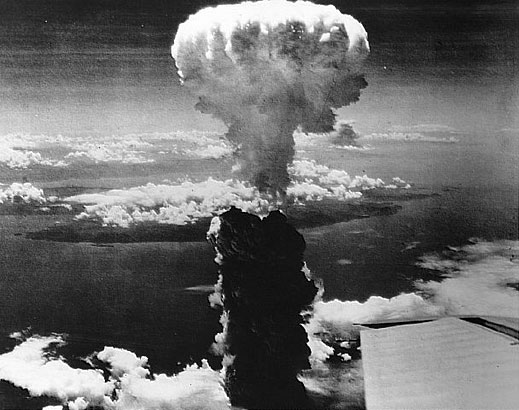When the time stood still. For a second at least. And then with a big bang a new age started. The nuclear or atomic age.
What I am talking about ? Well for those which forgot or never learned. The 6. August of 1945 marks one of the most important and yet as well controversial points of human history.
The first and only use of nuclear weapons in a war. Atomic bombings of Hiroshima and a few days later 9. August on Nagasaki

Well. The fascination and yet horror of the nuclear weapons explains it self. And still it never stops to be fascinating for a fallout fan-page anyway. But already shortly after the use of those weapons it was already controversial with those which believe that it stoped the war and those which have been frightened by the effects.
Something which continues during the cold war even today. The evolution of technology to its extreme increasing in size and with incredible power.
[youtube]http://www.youtube.com/watch?v=zsTRxXvQY0s&feature=fvst[/youtube]
[youtube]http://www.youtube.com/watch?v=WwlNPhn64TA&feature=related[/youtube]
so the 6. August is the day of the bomb. Or love. Either way you look at it.
[youtube]http://www.youtube.com/watch?v=iesXUFOlWC0[/youtube]
So what ever if you think it is bad, wrong or just fascinating. Letz just remember. - and that the cold war never went hot ...
Maybe you'll think of me when you are all alone ...
[youtube]http://www.youtube.com/watch?v=-gb0mxcpPOU&feature=related[/youtube]
What I am talking about ? Well for those which forgot or never learned. The 6. August of 1945 marks one of the most important and yet as well controversial points of human history.
The first and only use of nuclear weapons in a war. Atomic bombings of Hiroshima and a few days later 9. August on Nagasaki

Well. The fascination and yet horror of the nuclear weapons explains it self. And still it never stops to be fascinating for a fallout fan-page anyway. But already shortly after the use of those weapons it was already controversial with those which believe that it stoped the war and those which have been frightened by the effects.
Something which continues during the cold war even today. The evolution of technology to its extreme increasing in size and with incredible power.
[youtube]http://www.youtube.com/watch?v=zsTRxXvQY0s&feature=fvst[/youtube]
[youtube]http://www.youtube.com/watch?v=WwlNPhn64TA&feature=related[/youtube]
so the 6. August is the day of the bomb. Or love. Either way you look at it.
[youtube]http://www.youtube.com/watch?v=iesXUFOlWC0[/youtube]
So what ever if you think it is bad, wrong or just fascinating. Letz just remember. - and that the cold war never went hot ...
Maybe you'll think of me when you are all alone ...
[youtube]http://www.youtube.com/watch?v=-gb0mxcpPOU&feature=related[/youtube]


